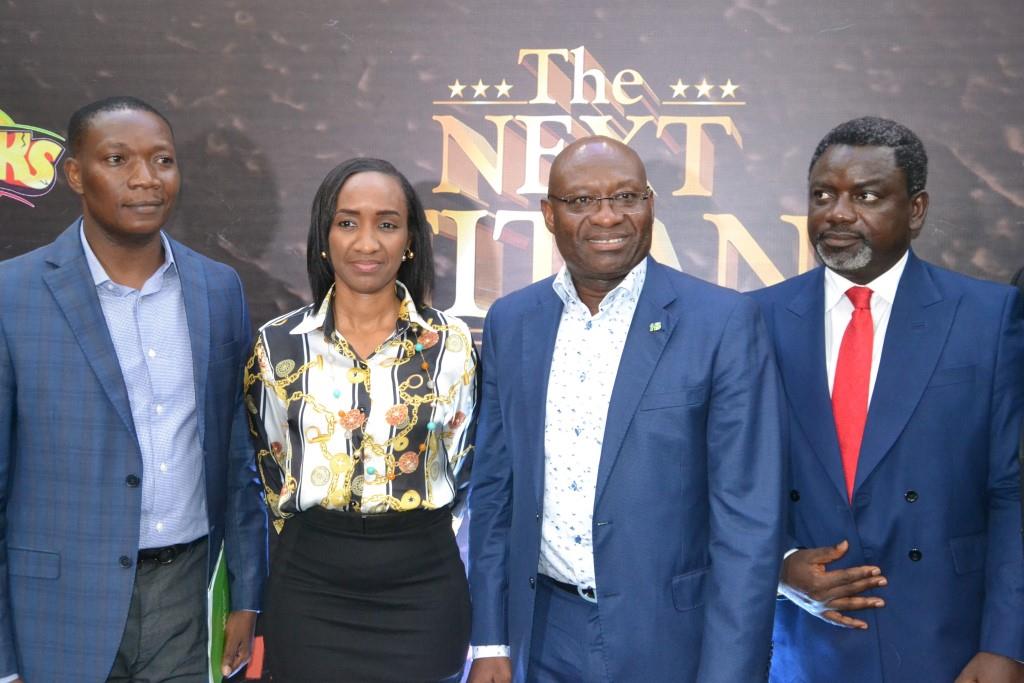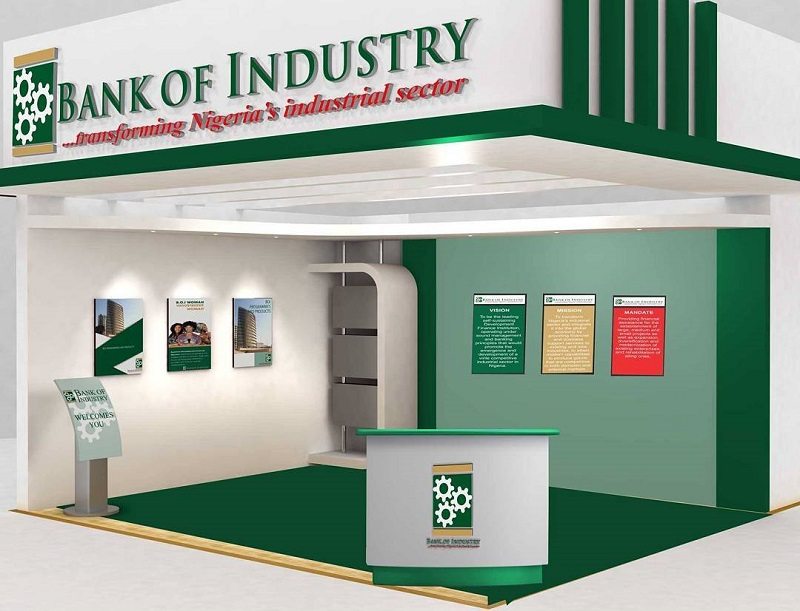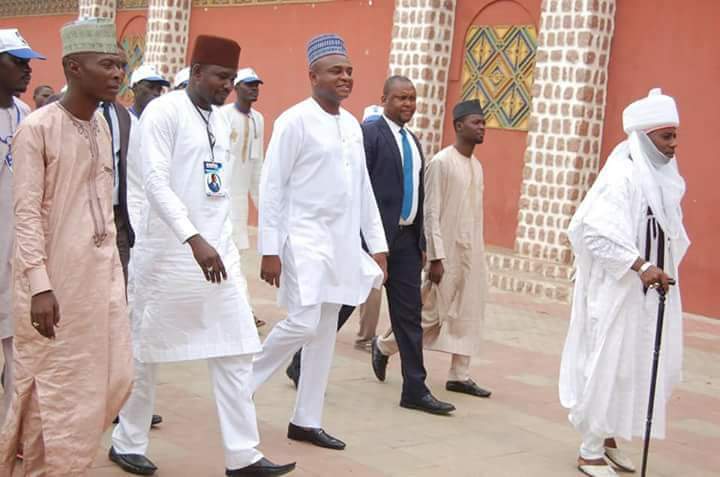Economy
Sekibo Wants Better Ties Between Banks, Entrepreneurs

By Dipo Olowookere
Managing Director of Heritage Bank Plc, Mr Ifie Sekibo, has encouraged the budding African entrepreneurs of the Next Titan Housemates to talk to small and medium enterprise (SME) desks of banks because the Central Bank of Nigeria (CBN) has a policy for disbursing money to banks for SMEs sector.
Mr Sekibo stated this while delivering a keynote address titled: Why African needs new breed of entrepreneurs and why is Heritage Bank championing it, at the premiere of the 5th edition of the Next Titan TV reality show in Lagos over the weekend.
The Next Titan is Nigeria’s entrepreneurial reality TV show where thousands of ambitious young entrepreneurs across the country compete with one another for a grand prize of N5 million and a brand new car to start his or her dream business.
He, however, challenged the budding entrepreneurs to stir up their entrepreneurship DNAs in a bid to allow innate ideas to flow and blossom.
According to Mr Sekibo, the entrepreneur is not the risk taker but the person who relentlessly pursue opportunities without recklessness, without regard to not having money, house or car or any strong financial support from family members, remarking that in most cases, he is the one that drops out at of school.
He said during the pre-colonial era in Africa, Africans, (our fore fathers) who were the entrepreneurs of those days in places like Lagos Island and Badagry were engaged in fishing and farming as well as trade across the west coast among themselves under an organised system.
The bank’s boss said during the colonial period, (our fathers) were affected by the culture and traditions of the colonialists a development which affected their psyche, thereby making what is foreign to be more important than what is local.
Mr Sekibo said western tradition became the order of the day as Africans moved away from entrepreneurship to white collar jobs to earn monthly income and the word job came into play, adding that work was no longer defined as the work of a tough man or woman on the farmland but depended on how much of the colonial language one understand.
In order to reverse the trend, Mr Sekibo contended that budding African entrepreneurs should relive the DNAs that their forefathers left for them by uncapping them so that their innate ideas could flow and blossom.
He said Africans burn with ideas but they needed to mine them so that they could blossom, remarking that they need to have mentors that will enable them to achieve their goals.
The Chief Executive also said money is very critical to entrepreneurship and they had to be bold and courageous to get it, adding that there is a spirit behind getting money which is largely influenced by character and integrity. He enjoined them to collaborate to bring down the cost of money.
Mr Sekibo enjoined them to be bold and should not be afraid to fail because failing is not a failure and should not give up because they had failed.
Also speaking, Mr Folusho Philips, Managing Director of Philips Consulting, listed some factors for successful entrepreneurship. They are competence, character and behaviour, study and steadiness as well as compliant and chemistry of the prospective entrepreneur.
Mrs Yetunde Odejayi, Permanent Secretary to the office of the Deputy Governor of Lagos State, noted that entrepreneurship was part of key programmes of the current administration. She encouraged them to be bold and resilient and be prepared to face challenges and also informed them about state’s Ministry of Wealth Creation and the Lagos State Trust Fund (LSSTF).
Mr Babarinde Abiona, General Manager (Marketing) with Coscharis Motors, tasked them to believe in themselves and be focused, adding that Coscharis, a major dealer of Ford Motors in the country will give a brand new Ford Focus to the winner.
One of the boardroom judges, Mr Chris Parkes, commended Heritage Bank for investing in the project and noted that judges would be very critical of their ideas because they want ideas that could add value to the country’s economy.
About 60 finalists were unveiled at the premiere out of more than 2,000 contestants that were screened at various auditions in Port Harcourt, Enugu, Abuja and Lagos, however only 16 made it to the house while Heritage Bank used a wild card to add two more contestants: Kalu Sylvester and Ugochi Ogadi to bring the number to 18.
Economy
Nigeria to Export New Crude Grade Cawthorne in March

By Adedapo Adesanya
The Nigerian National Petroleum Company (NNPC) Limited is set to commence export of a new light, sweet crude grade known as Cawthorne from March 2026.
According to a report by Reuters, an NNPC spokesperson confirmed the development, describing it as part of efforts to increase output and consolidate Nigeria’s recent recovery in crude oil production.
The move aligns with Nigeria’s broader strategy to boost production after years of constraints caused by pipeline vandalism, crude theft, and unrest in oil-producing regions.
This follows the launch of two other new grades, Obodo in 2025 and Utapate in 2024, Nigeria, whic,h as Africa’s top oil exporter, seeks to strengthen its standing within the Organisation of the Petroleum Exporting Countries and its allies (OPEC+)
Cawthorne crude is scheduled for export in the third week of March and has an API gravity of 36.4, making it similar in quality to Nigeria’s Bonny Light, which is prized for high petrol and diesel yields.
According to Reuters, citing a trading source, the state oil national company issued a tender last week for cargo loading between March 24 and 25.
Analysts at Kpler noted that the new grade is expected to be exported via the Floating Storage and Offloading (FSO) vessel Cawthorne, which has a storage capacity of about 2.2 million barrels. The vessel is designed to enhance transportation and production from Oil Mining Lease (OML) 18 and nearby assets in the Eastern Niger Delta.
Kpler estimates that, based on storage capacity, Cawthorne could increase Nigeria’s crude and condensate output from roughly 1.65 million barrels per day to around 1.7 million barrels per day for the remainder of the year.
Nigeria’s crude oil production recently dropped from the OPEC+ quota of 1.5 million barrels per day, with output at 1.48 million barrels per day recorded in January, according to OPEC data.
Beyond increasing Nigeria’s crude offerings to the international market, the introduction of Cawthorne could also attract buyers seeking specific light, sweet crude qualities, buoy foreign exchange earnings, which would help strengthen government revenue and ease borrowing needs.
New crude grades are typically differentiated by sulfur content, API gravity, and production source, enabling producers to target specific refinery configurations and market segments.
In November 2024, NNPC officially launched the Utapate crude oil blend in the international market, describing it as a milestone for Nigeria’s export profile.
Earlier in July 2024, NNPC and its partner, Sterling Oil Exploration & Energy Production Company (SEEPCO), lifted the first 950,000-barrel cargo of Utapate crude, which was shipped to Spain.
Economy
Moniepoint Research Shows Diminishing Role of Cash in Nightlife Payments

By Modupe Gbadeyanka
A new report released by Africa’s leading all-in-one financial ecosystem, Moniepoint Incorporated, has revealed that the use of cash for financial transactions is gradually dying due to security concerns.
The study, which looked into transaction data of over 27,000 clubs, bars, and lounges, showed that bank transfers dominated, followed closely by card payments, with cash actively discouraged. It was observed that transfers outpace card payments by nearly 2 million transactions during peak nighttime hours across its network.
In the research titled The Business of Community Nightlife in Nigeria, findings provided a rare, data-driven look into the country’s informal night economy.
While high-end Detty December venues grabbed headlines with daily revenues of N360 million and table prices reaching N1.2 million, Moniepoint’s study shifted the spotlight to the “community nightlife” where roadside bars, suya spots, and neighbourhood joints form the bedrock of social life for millions of Nigerians.
One of the study’s most operationally significant findings concerns the timing of spending. Nightlife in Nigeria runs late, but economically, the night is decided early.
Transaction volumes begin climbing sharply from 8 pm, peak before midnight, and then decline steadily even as venues remain full. By the time the night is at its longest, purchasing activity has already wound down.
However, for bar operators, this has clear practical implications – the most critical hours for staffing, stocking, vendor payment and cash flow management are the earliest hours of the day between midnight and 6 am.
The report further underscores the sector’s role in employment, noting that local bars typically expand their workforce by 30-50 per cent on peak nights. Conservative estimates suggest that at least 54,000 people are engaged in nightlife labour every night across Nigeria.
It was also observed that the most common transaction narrations from the data sourced – “food”, “pay”, “sent”, “pos”, “cash” – reflect the full breadth of nightlife spending: street food, club entry, lounge tabs, transport, and afterparties. Digital payments have gained huge traction in Nigeria’s social space.
While alcohol remains a key revenue driver, the data shows that food is the quiet stabiliser of Nigeria’s night economy, particularly in local and informal settings. In several neighbourhood venues, bottled water and meals outsell beer and spirits, especially early in the evening.
Lagos leads in sheer concentration of nightlife establishments, with 4,856 bars, clubs, and lounges on the Moniepoint network. FCT follows with 2,515, then Rivers (2,362), Delta (1,930), and Edo (1,574).
Katsina leads the country in nighttime food truck payment value, with vendors pulling in over N130 million in the last 12 months. Kwara State leads in transaction count. Nigeria’s nightlife economy is distributed, not overly elitist.
On the lending side, the report noted that a significant share of loan requests from bar and lounge operators is directed toward renovations, furniture, lighting, and sound systems, showing that investments are intended to attract and retain customers in a competitive sector where ambience plays a decisive role.
Commenting on the report, the chief executive of Moniepoint, Mr Tosin Eniolorunda, said, “Nigeria’s local bars and night-time operators are not peripheral to the economy; they are a critical part of its architecture. We see a substantial and sustained economic sector that employs hundreds of thousands of Nigerians every night and deserves the same attention we give to agriculture, healthcare, and retail.
“Our goal is to make sure every one of those businesses has the tools to grow. From giving credit to finance renovations and sound systems to providing same-day settlement that allows vendors to restock and with tools like Moniebook that power inventory management and reconciliation, Moniepoint is ensuring that this vital artery of the nation’s economy remains viable and empowering.”
Economy
CBN Reduces Interest Rate by 50 Basis Points to 26.50%

By Adedapo Adesanya
The Central Bank of Nigeria (CBN) has cut the interest rate by 50 basis points to 26.50 per cent from 27 per cent.
Nigeria’s apex bank announced this during its two-day 304th Monetary Policy Committee (MPC) meeting, which concluded on Tuesday in Abuja.
This comes after the country’s interest rate cooled in January to 15.10 per cent from 15.15 per cent, according to the National Bureau of Statistics (NBS), strengthening the case for a reduction.
The CBN Governor, Mr Yemi Cardoso, said all members of the MPC unanimously agreed upon the decision.
“The committee decided to reduce the monetary policy rate by 50 basis points to 26.50 per cent,” he said.
Mr Cardoso stated that the liquidity ratio was maintained at 30 per cent, and the standing facilities corridor was adjusted to +50 to -450 basis points around the monetary policy rate.
He said the committee retained the Cash Reserve Ratio (CRR) at 45 per cent for commercial banks and 16 per cent for merchant banks, while the 75 per cent CRR on non-TSA public sector deposits was equally maintained.
The CBN uses the MPR, which works as the benchmark interest rate, to manage inflation, macroeconomic stability, and liquidity.
Last November, the MPC retained the Monetary Policy Rate (MPR) at 27.00 per cent. The last time the apex bank cut interest rates was in September last year, to 27 per cent from 27.50 per cent after a series of easing in inflation.
Market analysts had argued for higher interest cuts due to results seen in the CBN’s inflation targeting framework. Meanwhile, some say the 50 basis points reduction will offer a temporary reprieve as inflation heads for a single-digit target in the coming months.
-

 Feature/OPED6 years ago
Feature/OPED6 years agoDavos was Different this year
-
Travel/Tourism10 years ago
Lagos Seals Western Lodge Hotel In Ikorodu
-

 Showbiz3 years ago
Showbiz3 years agoEstranged Lover Releases Videos of Empress Njamah Bathing
-

 Banking8 years ago
Banking8 years agoSort Codes of GTBank Branches in Nigeria
-

 Economy3 years ago
Economy3 years agoSubsidy Removal: CNG at N130 Per Litre Cheaper Than Petrol—IPMAN
-

 Banking3 years ago
Banking3 years agoSort Codes of UBA Branches in Nigeria
-

 Banking3 years ago
Banking3 years agoFirst Bank Announces Planned Downtime
-

 Sports3 years ago
Sports3 years agoHighest Paid Nigerian Footballer – How Much Do Nigerian Footballers Earn




















